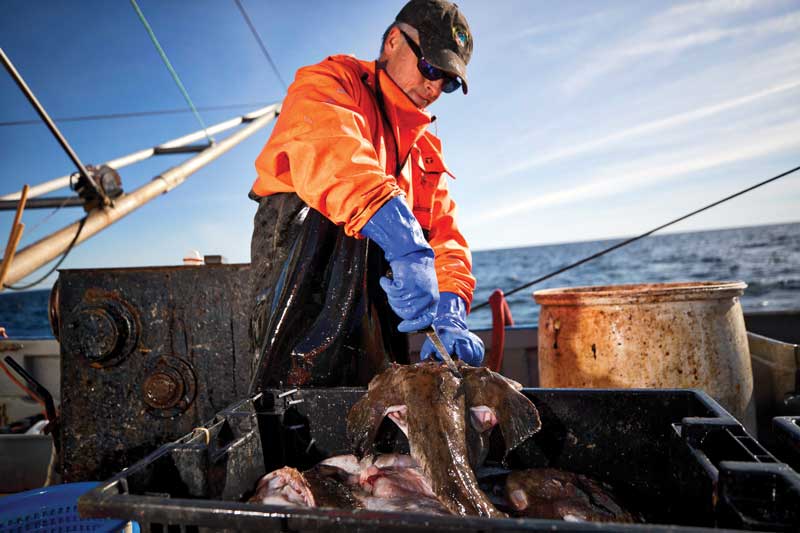 Fisherman Vincent Balzano is shown cleaning monkfish. Photo by Scott Gable
Fisherman Vincent Balzano is shown cleaning monkfish. Photo by Scott Gable
What once might have been a famine in terms of earnings for Maine’s commercial fishermen has been transformed into a feast for schools and community food programs across the state, thanks to a recipe that includes a healthy helping of creative thinking seasoned with a timely infusion of grant money to get things cooking.
It all began during the early days of the global pandemic, when restaurants shut down and demand for seafood in overseas markets slowed to a trickle. The result was that there were few takers for the fish being landed by Maine’s fleet.
That’s when the Maine Coast Fishermen’s Association—an organization originally founded by fishermen to advocate for policies that enable them to continue their livelihood as well as to protect the resource—shifted gears to address the immediate needs of Maine fishermen.
That need was a market for their catch. And the solution, Fishermen Feeding Mainers, created a sustainable demand for seafood that also goes after an equally vexing problem for Mainers: food insecurity.
“When I think of FFM, I consider it a win-win for everyone,” said Vincent Balzano, a third-generation Portland fisherman who has been involved in fisheries and fisheries management for more than 30 years. “The program establishes a floor for our fish prices and it also allows us to give back to the community. We literally had a situation where we weren’t getting bids on our fish. FFM stabilized that market for us. It also benefits the local processors and helped keep them going—and it also helped us work more collaboratively together. I am very grateful for the work of Maine Coast Fishermen for making this happen.”
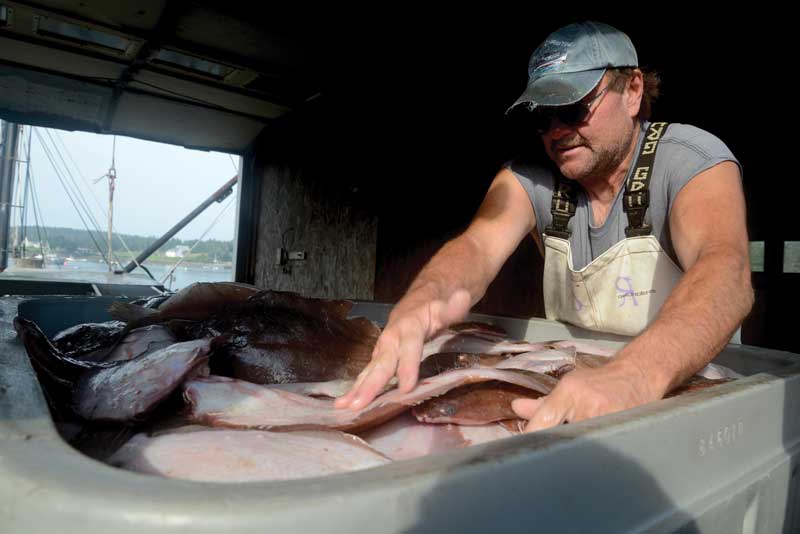 Randy Cushman, one of the fishermen who has participated in the Fishermen Feeding Mainers program, packs a crate of monkfish. Photo by Scott Gable
Randy Cushman, one of the fishermen who has participated in the Fishermen Feeding Mainers program, packs a crate of monkfish. Photo by Scott Gable
Much of Maine’s fishing fleet is composed of independent owner-operated fishermen who manage their own businesses. Together, they fish for a suite of species, collectively called groundfish because they live close to the “ground” or bottom of the sea floor. These include cod, haddock, flounder, monkfish, hake, and pollock. These fish are typically harvested by gillnet or trawl and the fishery is strictly managed for sustainability. In addition, many of the fishermen in this fleet participate in research projects to contribute data to the management of the resource including having cameras on board that help to document their catch.
As the market for groundfish dried up, MCFA was fortunate to receive funding from an anonymous foundation to start what took shape as the Fishermen Feeding Mainers program. That was now over two years and a million meals ago.
The seed money enabled the organization to purchase fish at a fair price from the fishermen who sell their catch at the Portland Fish Exchange and have it processed right there on the waterfront, where it was frozen and put into boxes of filets. The fish was then made available to organizations addressing food insecurity. Since then, a combination of federal and state pandemic relief funding as well as support from individual and corporate donors, foundations, and grants have all allowed the program to persist.
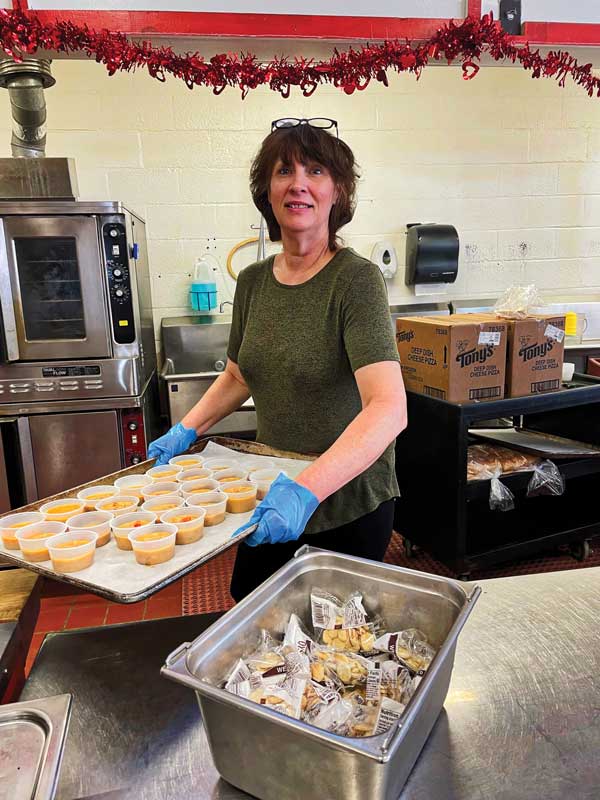 Barbara Austin, head chef at the Brunswick Junior High, serves samples of Monkfish Stew. Photo by Susan OlcottGood Shepherd Food Bank, based in Auburn, was the first partner and used its delivery system to get fish to more than 200 food banks from Skowhegan to Kennebunk. From there, the program grew to include the Department of Education, which coordinated with schools to get the word out about the available fish—a source of healthy protein not often affordable or available to cafeterias in Maine schools.
Barbara Austin, head chef at the Brunswick Junior High, serves samples of Monkfish Stew. Photo by Susan OlcottGood Shepherd Food Bank, based in Auburn, was the first partner and used its delivery system to get fish to more than 200 food banks from Skowhegan to Kennebunk. From there, the program grew to include the Department of Education, which coordinated with schools to get the word out about the available fish—a source of healthy protein not often affordable or available to cafeterias in Maine schools.
To date, there are more than 20 districts from Kittery to Fort Kent participating in the program, which has not only included free fish, but also culinary training sessions and recipes translated into seven languages for nutrition staff.
In addition, community groups such as Wabanaki REACH and the Somali Bantu Association have requested specific types of fish and received direct donations. Meanwhile others such as Portland’s Wayside Food Programs and MaineHealth’s pantry have requested whole fish like gray sole that can be prepared in accordance with halal traditions. Being able to provide these species and types of processing of donated fish is a new direction for the Fishermen Feeding Mainers program.
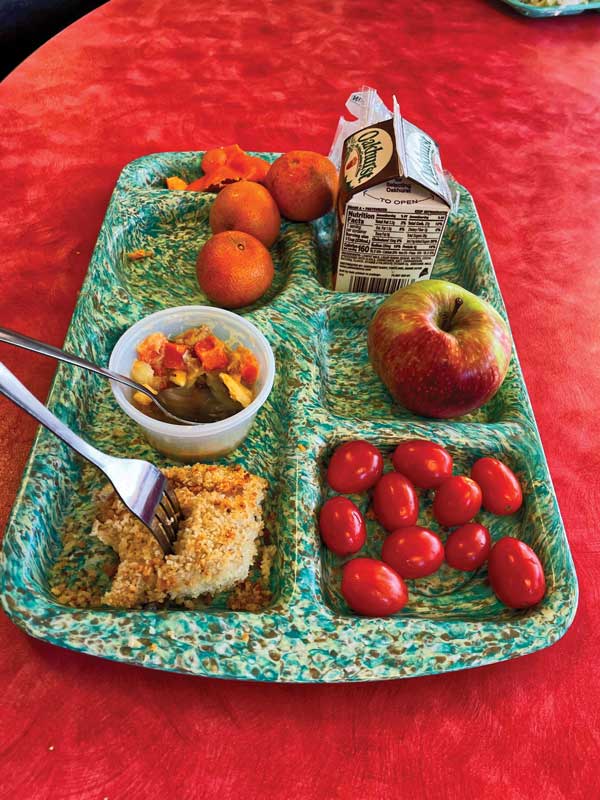 A crunchy baked haddock lunch is made with fish donated through the FFM program. Photo by Susan OlcottAs the program has grown, MCFA has noted its impacts all along the seafood supply chain. More boats are returning to land in Portland now that fishermen and their crew can anticipate a stable market. And there are opportunities for more seafood workers and seaside businesses that support those boats as well as process and store the fish.
A crunchy baked haddock lunch is made with fish donated through the FFM program. Photo by Susan OlcottAs the program has grown, MCFA has noted its impacts all along the seafood supply chain. More boats are returning to land in Portland now that fishermen and their crew can anticipate a stable market. And there are opportunities for more seafood workers and seaside businesses that support those boats as well as process and store the fish.
The response from recipients has been positive as well. Kimberly Gates, executive director at the Bath Area Food Bank, told MCFA, “We are so fortunate to have been able to get haddock. I got a message from a woman who went on and on and on about how fresh her haddock was. She said, ‘I actually cried when I was able to serve it to my family. We have not been able to afford any fish for a very long time.’ I hear over and over what a treat fresh haddock is for my families. We would not be able to give them such a beautiful product without you and your funding.”
Three years on, Fishermen Feeding Mainers continues to expand. Opportunities to work with multicultural audiences are growing as are the avenues to reach more schools, particularly in more rural communities of Maine where students rarely have access to healthy seafood protein. The demand for the program continues to grow as does the need for financial support from the community to sustain it.
✮
Susan Olcott is director of operations for the Maine Coast Fishermen’s Association. She has a background in marine science and is a columnist for Brunswick’s Times Record and a contributor to several other Maine publications. An avid boater, she spends as much time on the water as possible with her husband and two daughters.
For information on the Fishermen Feeding Mainers program and about the stew, visit www.mainecoastfishermen.org.
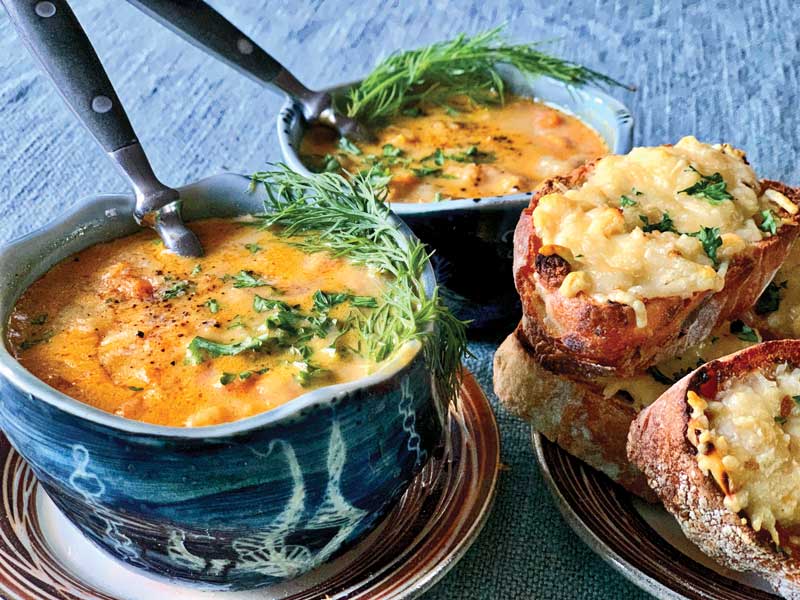
Soup’s On!
If you’re looking for a delicious meal to grab and have hot and ready aboard your boat this summer—or maybe enjoy fireside in the off season—you can have your stew and eat it too, knowing you are supporting a sustainable fishery, local fishermen, and those facing food insecurity throughout the state.
Early on in the Fishermen Feeding Mainers program, the Maine Coast Fishermen’s Association got feedback from recipient groups that monkfish wasn’t a catch they were familiar with and that there was a need for a way to introduce this tasty, but quite ugly looking, fish to consumers.
Monkfish are a little different from other groundfish that have most of their meat on their flanks. Rather, they have a giant toothy jaw and a big meaty tail, which is where the meat comes from. As a result, it cooks a bit differently than other more flakey white fish. But the strong muscles in the tail make it hold together better as well—particularly in a stew.
That led the MCFA into a partnership with Hurricane’s Premium Soups & Chowders in Greene, Maine, to test the creation of what has now become Maine Coast Monkfish Stew.
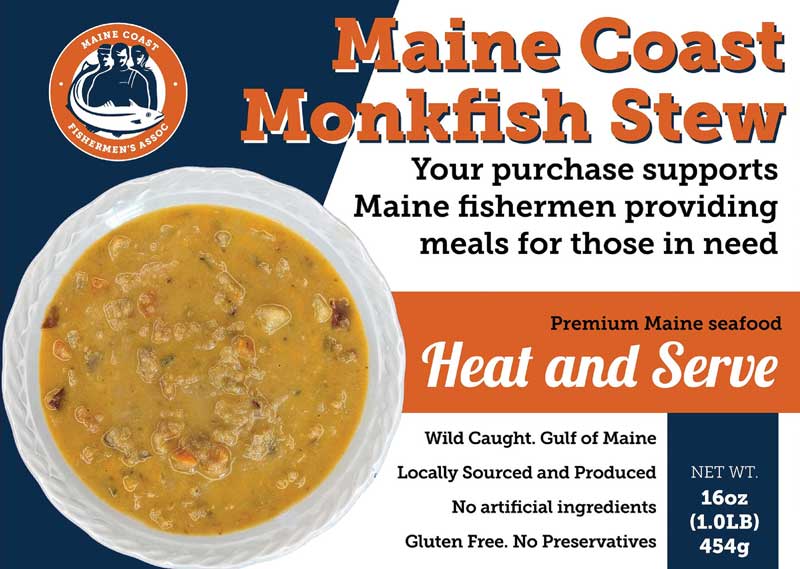 No time to cook dinner? Pick up crackers and a package of Monkfish Stew at one of 70 markets statewide.Since its launch into retail markets in 2022, it is now for sale or being served at more than 70 markets and restaurants throughout the state. The project comes full circle, as the proceeds from the sale of the stew benefit the Fishermen Feeding Mainers program. The stew recently qualified under the Department of Education’s Local Food Fund, which means its cost is partially reimbursable, making it more affordable for schools.
No time to cook dinner? Pick up crackers and a package of Monkfish Stew at one of 70 markets statewide.Since its launch into retail markets in 2022, it is now for sale or being served at more than 70 markets and restaurants throughout the state. The project comes full circle, as the proceeds from the sale of the stew benefit the Fishermen Feeding Mainers program. The stew recently qualified under the Department of Education’s Local Food Fund, which means its cost is partially reimbursable, making it more affordable for schools.
It’s a win all around, with the opportunity to try monkfish if you aren’t already familiar with it, or enjoy an easy-to-serve take home meal if you’re already a fan. Either way, you’ll help support the local seafood economy as well as those facing food insecurity in Maine.






